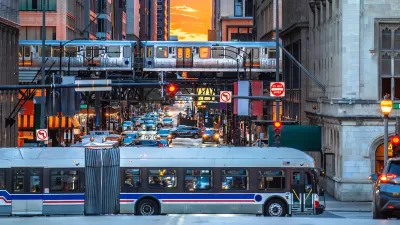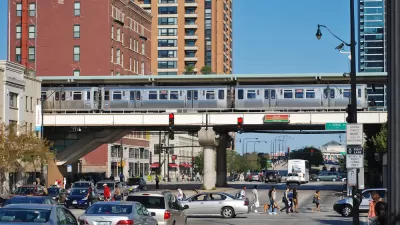Sluggish ridership rates and staffing shortages are dampening recovery. Looming budget gaps could make things even worse.

Transit ridership across the United States fell sharply when the pandemic hit in 2020, and most major cities still have not fully recovered. That’s particularly true for Chicago, the country’s second largest public transportation system.
According to an article from Chicago news outlet WGN9, CTA (Chicago) ridership is 60 percent recovered. In comparison, Los Angeles is 74 percent recovered and Washington, D.C. 76 percent recovered. Nationwide, public transit across all modes has recovered to 79 percent, according to the American Public Transportation Association
The WGN9 article details the drivers of the CTA’s sluggish recovery, which include service cuts, reliability issues, and staffing shortages. The cuts in service were intended to bring the schedule in line with demand, but between those cuts and not enough bus and rail operators to serve the runs, riders are suffering “a loss of confidence in the CTA to deliver on the most basic promises: trains and buses arriving on schedule,” report Mike Lowe and Austin Kleber.
Along with a projected 2026 budget gap of $730 million between CTA, Pace, and Metra now that federal COVID relief has come to an end, additional service cuts and employee layoffs lie ahead if additional revenue streams are not secured.
FULL STORY: CTA lags comparable cities in ridership recovery, staffing shortage remains a ‘crisis’

Planetizen Federal Action Tracker
A weekly monitor of how Trump’s orders and actions are impacting planners and planning in America.

Maui's Vacation Rental Debate Turns Ugly
Verbal attacks, misinformation campaigns and fistfights plague a high-stakes debate to convert thousands of vacation rentals into long-term housing.

Restaurant Patios Were a Pandemic Win — Why Were They so Hard to Keep?
Social distancing requirements and changes in travel patterns prompted cities to pilot new uses for street and sidewalk space. Then it got complicated.

In California Battle of Housing vs. Environment, Housing Just Won
A new state law significantly limits the power of CEQA, an environmental review law that served as a powerful tool for blocking new development.

Boulder Eliminates Parking Minimums Citywide
Officials estimate the cost of building a single underground parking space at up to $100,000.

Orange County, Florida Adopts Largest US “Sprawl Repair” Code
The ‘Orange Code’ seeks to rectify decades of sprawl-inducing, car-oriented development.
Urban Design for Planners 1: Software Tools
This six-course series explores essential urban design concepts using open source software and equips planners with the tools they need to participate fully in the urban design process.
Planning for Universal Design
Learn the tools for implementing Universal Design in planning regulations.
Heyer Gruel & Associates PA
JM Goldson LLC
Custer County Colorado
City of Camden Redevelopment Agency
City of Astoria
Transportation Research & Education Center (TREC) at Portland State University
Jefferson Parish Government
Camden Redevelopment Agency
City of Claremont





























